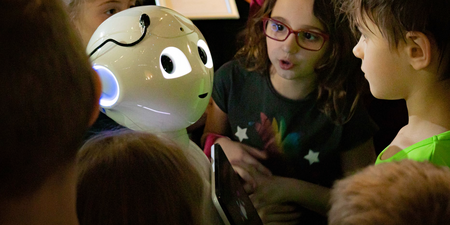
Ecce, Karel!
Saturday 19 March 2022 in Brno's Vida Science Centre belonged to robots. The main star of the event "Vida! Robots" was Karel Pepper, a robot member of the Natural Language Processing (NLP) Centre at the Faculty of Informatics of MU.
Karel attracted hundreds of visitors. The younger ones were especially interested in how much Pepper costs and whether they could get one for their home. Adult visitors then discussed with representatives of FI MU how Pepper is programmed or about its learning process and human-robot interaction. Everyone also got to experience how smooth a dialogue Pepper is able to have.
The event also offered the opportunity to make a glowing, wooden or paper robot, try driving in a formula simulator or play air hockey against a robot. There were also lectures and talks on what robots can do and why it is easier for them to do a somersault, for example, than to open a doorknob with their hands. The whole program was prepared by VIDA! in cooperation with JCMM.
Unfortunately, it is not easy to get Karel home, but he lives at FI MU, where he participates in many public events in addition to the research itself. For example, he will be presented at Researches’ Night 2022, FI MU's fall open days, and other occasions . You can also meet Karl at MjUNIon - an online portal for all young and old researchers (CZ only).
The NLP lab where Karel Pepper works is focused on obtaining theoretical and applied results in the field of natural language processing. Their work mainly concerns corpus linguistics, lexical databases, knowledge representation, representation of the meaning of natural language expressions, and the use of machine learning methods for automatic text processing. In terms of downstream applications, research focuses on human-machine communication and Internet technologies centered on text and speech analysis, mining and generation. The laboratory also trains a number of graduate and undergraduate students of FI MU based on the above mentioned research.
Photo: Vida! Science Center
- Attachments